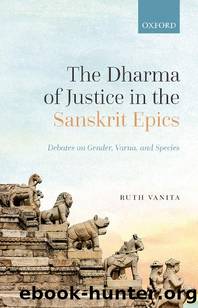The Dharma of Justice in the Sanskrit Epics by Ruth Vanita

Author:Ruth Vanita [Vanita, Ruth]
Language: eng
Format: epub
Publisher: OUP Oxford
Published: 2021-12-31T00:00:00+00:00
Thus, Bhishma rules in deference to a woman, which makes him unique among major rulers in the epics.
Bhishma tells Ambaâs story with sympathy for her. Unlike her lover Shalva, who considers her unchaste, Bhishma throughout calls her a kanyÄ (virgin or maiden) and a true or chaste girl (satÄ«á¹ bÄlÄá¹, 5.173.12). Listing the warriors on both sides, Bhishma praises Shikhandin, saying he is a great warrior who will earn fame (SR 5.171.1â3).
The argument that Bhishma is the worst patriarch appears to rest on two eventsâfirst, that he stays silent when Draupadi is mistreated, and second, that he carries Amba and her sisters away from their svayaá¹vara. I discuss the second in Chapter 7.
As regards Draupadi, Bhishma does stay silent but so do the other elders, Drona, Kripa, and Dhritarashtra, of whom only Dhritarashtra has the authority to stop Duryodhana. The reason for Bhishma, Drona, and Kripaâs silence is that they are dependent on Duryodhana. For the same reason, they fight on Duryodhanaâs side in the war although they repeatedly rebuke him and advise him to make peace.
Bhishma does speak, when Draupadi addresses the elders. He says that he cannot say with certainty whether or not Duryodhana has technically won her, but he knows for sure that Duryodhana and his brothersâ misconduct will soon destroy the entire clan. He praises Draupadi for having acted throughout in accordance with dharma.
Bhishma, though flawed like every character in the epic, is very far from being a demon. Other characters compare Duryodhana and sometimes Bhima to a demon. Never does anyone suggest that Bhishma is demonic. Amba never calls him demonic.
Bhishma is a part of Prabhasa, elemental deity of the sky, who is one of the eight Vasus, attendant deities of Indra. Vaishampayana does say that the minds of Bhishma, Kripa, and Drona were taken over by demons, which resulted in reducing their affection for the Pandavas and their agreeing to fight for the Kauravas, most of whom are incarnations of demons (3.240.11, 34). But this possession is not complete, because Bhishma continues to praise the Pandavas through the war, and advises them how to kill him. At best, one could say that a demon (Shikhandin) kills a divine being (Bhishma) who is temporarily and partly possessed by a demon.
Unlike demons who seek pleasure, power, and wealth, Bhishma gives up pleasure and power for his fatherâs sake, devotes himself to his stepmother, half-brothers, and nephews, and finally gives up his life for his great-nephews. By any standards, Bhishma dies a spiritually elevated death. When he falls in battle, the great sages appear as swans to walk around Bhishma on his bed of arrows (6.114.92â93), and he meditates on the yoga of the Upanishads (6.114.112).
Shikhandin is nowhere mentioned; he disappears from this part of the narrative. This is nothing like a Goddess narrative. Bhishma reconciles with and blesses Karna (6.117) but has no final meeting with Shikhandin.
Next morning, warriors of both parties go to pay respects to Bhishma (6.116.1â2). Bhishma blesses and praises Arjuna, and advises Duryodhana to end the battle and reunite families (6.
Download
This site does not store any files on its server. We only index and link to content provided by other sites. Please contact the content providers to delete copyright contents if any and email us, we'll remove relevant links or contents immediately.
The Compleat Magical Path Magic Lessons by John Cross(424)
The Return of the Dragon : The Shocking Way Drugs and Religion Shape People and Societies by Lewis Ungit(397)
THEM: They Come at Night by Tom Lyons(392)
The Bonds That Bind by K. J. Lavallee(388)
Dogme et Rituel de la Haute Magie Part I by Eliphas Levi(376)
The Mind at Large: Clairvoyance, Psychics, Police and Life after Death: A Polish Perspective by Weaver Zofia & Janoszka Krzysztof(372)
Strange Tricks by Syd Moore(368)
Shaman: The Mysterious Life and Impeccable Death of Carlos Castaneda by Mike Sager(365)
The Iron Republic by Richard Jameson Morgan(360)
Haunted Ships: True Paranormal Ghost Ship Stories by Press Chronicle(355)
Psychic Secrets by Jade-Sky(354)
101 Ways to Jump-Start Your Intuition by John Holland(350)
Kabbalah and Sex Magic by Marla Segol(344)
Cult Cinema: A Personal Exploration of Sects, Brainwashing and Bad Religion in Film and Television by Ingham Howard(343)
Evil Unleashed: True Tales of Spells Gone to Hell and Other Occult Disasters by John Harker(328)
Kickstart My Witch (Witch's Guide to Haunted Properties: Los Angeles: Mystery Book 1) by Lotta Smith(327)
The Blood Electric: Nephilim Unbound 5 by Jason Caldwell(325)
The Satanism Scare by Joel Best(318)
The Airmen Who Would Not Die by Fuller John G(311)
